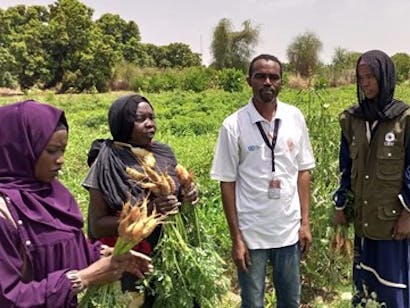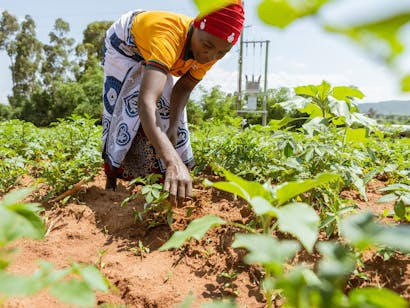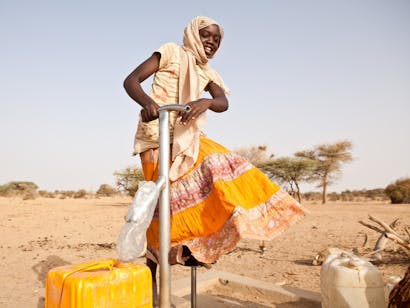Regreening Africa: A Transformative Journey in Combating Land Degradation
The success of the Regreening Africa programme is a testament to its exceptional ability to unite research institutes, communities, government, and civil society. The collaborative knowledge generated on climate resilience, value chain development, and sustainable land management is invaluable for future interventions in Africa. Originally conceived as a pilot project to combat land degradation, Regreening Africa has far surpassed its initial scope, becoming a benchmark for future projects.

Regreening Africa’s Impressive Achievements
Over the past five years, Regreening Africa has successfully addressed land degradation, improved livelihoods, and fostered resilience in eight African countries. Its impact, reaching almost a million hectares of land and over 500,000 households in the Sahel and the Horn of Africa, has set the stage for scaling up restoration efforts. The program’s success lies in its combination of technological innovations, community engagement, and adaptive learning approaches.
Reflections from the Partnership
Regreening Africa Phase I showcased its ability to impact a vast landscape and millions of people, emphasizing the urgent need to scale its approach. The program effectively demonstrated that integrating land restoration interventions, especially through planting or regenerating local and indigenous species, provides multiple benefits, including increased biodiversity, carbon sequestration, water retention, and improved livelihoods.
Prominent international initiatives, including the United Nations Decade on Ecosystem Restoration and the Great Green Wall Initiative, align with Regreening Africa’s mission, underscoring the imperative need to support and leverage the program’s unique consortium and outcomes.
Regreening Africa’s Unique Approach
Regreening Africa’s first phase, funded by the European Union, dedicated five and a half years to restoring vast areas of land across eight African countries. The program’s approach, driven by a partnership of organizations with diverse perspectives, focused on policy, implementation, and research. A dynamic collaboration between communities, development actors, government, and research institutions enabled the extensive scaling of contextually adapted practices, generating essential evidence and facilitating knowledge exchange.

Regreening Africa’s success lies in its Options by Context (OxC) approach, tailoring restoration options to local, social, and agroecological conditions. By understanding and addressing the diverse needs and circumstances of smallholder farmers, the program deployed a range of land restoration practices and promoted policy changes based on their suitability for different contexts.
Impact and Achievements
Regreening Africa’s impact is evident in its support to over 600,000 households, covering nearly one million hectares of land. The program’s cost-effective regreening practices, with costs as low as 30 EUR, have catalyzed broader efforts to restore tens of millions of hectares of degraded land throughout Africa. The program not only achieved its targets of one million hectares and 500,000 households but also contributed to global, regional, and national commitments in eight African countries.
Regreening Africa stands as a transformative model in combating land degradation, providing a blueprint for future sustainable interventions. The program’s legacy, shaped by collaboration, adaptability, and inclusivity, sets a precedent for the broader restoration of landscapes and livelihoods across Africa’s semi-arid regions.
Regreening Africa has been shortlisted as an official UN World Restoration Flagship.
World Restoration Flagship of the UN Decade
In a significant milestone for the Regreening Africa initiative, it has been officially selected as a World Restoration Flagship of the UN Decade on Ecosystem Restoration. This prestigious recognition acknowledges the program’s outstanding contribution to ecological rejuvenation and sustainability across the African continent. While the official announcement is slated for February next year, the interim acknowledgment allows us to declare that “Regreening Africa has been shortlisted as an official UN World Restoration Flagship.”

Photo: CARE
To mark this achievement, a comprehensive launch plan is in place, including global and in-country press releases leading up to the UN Environment Assembly 6 in February 2024. A social media campaign, in-person moments at UNEA events, a mini-documentary series, and in-depth feature stories are part of the elaborate rollout strategy. Regreening Africa was also featured at COP28 events, showcasing its pivotal role in climate resilience, land restoration, and biodiversity conservation. The recognition as a UN Decade Global Flagship underscores the program’s commitment to advancing ecosystem restoration and sustainable development in Africa.
Documents:
- Regreening Africa final report English / French
- Endline survey Report English / French
- Outcome stories on policy/institutional engagement
- Insight series
- Reports, posters, and information on each country from the final workshops can be found here.


